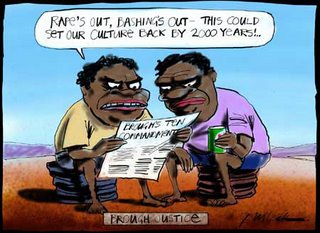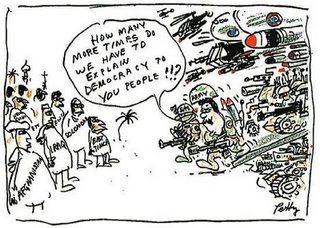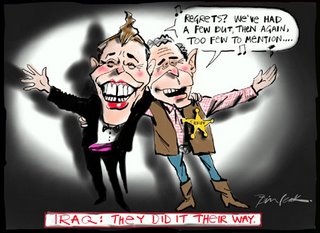Bush says we're like Texans, but it's wishful thinking



I like this one from the age:
By Michael GawendaMay 29, 2006
After John Howard's effusive praise for him as a leader of great courage and conviction on the White House lawn, after all the pageantry of the welcome, including a rare 19-gun salute and the brilliant manoeuvres of the presidential ceremonial guard, after the glittering banquet at which Howard again lauded him in terms that have not been heard from a foreign leader in Washington for a long time, if ever, George Bush's poll ratings remained dismal and falling.
Not even the Australian Prime Minister, the world's most successful conservative politician, could, despite his best efforts, deliver even momentary relief from Bush's seemingly inexorable slide to approval ratings that even Kim Beazley has managed to avoid.
Howard's Washington extravaganza and his spruiking of Bush received reasonable coverage in the US media. Bush praising Howard and Howard lauding Bush wasn't exactly headline news, but it got a couple of minutes on most of the cable TV stations and even on some of free-to-air services.
CNN's Wolf Blitzer, in an extended interview, pushed Howard hard to say something, anything, that might represent a difference between the Prime Minister and Bush, but to no avail.
No, there's nothing, was Howard's stock response. Bush is a great leader and Australians and Americans share common values. Blitzer was so keen for Howard to say something interesting that he asked whether Howard planned to retire any time soon, a question no doubt exercising the minds of millions of Americans. No luck there either.
In Washington media and punditry circles, there seemed to be two basic responses to Howard's visit and his unequivocal support for Bush and his repeated claims that Australia and America shared common values. Some saw this as entirely predictable and humdrum. Bush and Howard are good friends and Americans consider Australians family, there when you need them. And to be more or less taken for granted.
Others suggested that Bush was so desperate, so friendless, that the White House had asked Howard, the last friend still firmly by Bush's side, to come on over and get the sort of treatment usually reserved for kings and queens.
That the White House asked Howard to come to Washington may or may not be true, but it's nevertheless interesting that many people in Washington believe it. Bush is in so much political trouble, especially on Iraq, that anything is worth a try.
It is certainly the case that British Prime Minister Tony Blair's trip to Washington last week had none of the pomp and ceremony that marked Howard's. For Blair, this was a meeting with Bush he had to have but one that he knew had no political upside.
Bush had lots of nice things to say about Howard as well, of course, and he expressed his great affection for Australia, though when he suggested that Australians reminded him of Texans, you had to wonder just how much he knew about the place and just how many Australians he had met.
You had to wonder, too, about Howard's claim about shared values with Bush as well. Howard's visit came during a ferocious debate in America about illegal immigration.
The Republican Party-dominated House of Representatives had passed draconian legislation that would criminalise the estimated 11 million illegal immigrants in the country and eventually have them deported. A wall would be built along the 1341-kilometre border with Mexico to stop the estimated 500,000 or more people coming into the US each year. And the children of illegal immigrants born in the US would be denied citizenship, a move that would require a constitutional amendment.
Battered and bruised politically, sinking in the polls, increasingly deserted by congressional Republicans eager to distance themselves from him before the November mid-term elections, Bush nevertheless refused to endorse the bill.
Indeed, he went on national television to reject it, knowing that this would infuriate his conservative supporters and the talkback radio loudmouths warning incessantly that Bush was determined to flood the country with "brown people".
In front of Howard, at their joint White House news conference, Bush condemned those demonising the illegal immigrants and insisted that they were good people simply wanting to live the American dream. America was a nation of immigrants. To deport these people, he said, would be un-American.
Yes of course, Australia's illegal immigrant problem is different, but nevertheless, given the Howard Government's treatment of the few thousand boat people who have tried to make a new life for themselves in Australia, you had to wonder what Howard made of Bush's impassioned defence of America's illegal immigrants. Did he share this "value" with Bush?
Among the values that Howard suggested were shared between Australians and Americans was a commitment to "the family" as the basis of all that was good both socially and economically about liberal democracies.
In America at the moment, a commitment to the family basically means you want to deny homosexuals the right to marry, the right to adopt children and the right to any sort of legal recognition of long-term homosexual relationships.
In the next two weeks, the Senate will debate a bill for a constitutional amendment that would define marriage as "a union between a man and a woman", and would deny gays and lesbians the legal rights that marriage "confers".
Behind this push for a constitutional ban on gay marriage is the widespread conviction among social conservatives that gays and lesbians represent a growing threat to traditional American values and to America's children.
Is this what Howard had in mind when he said Australia and America shared a commitment to the family?
And on that stuff from Bush about how Texans are so much like Australians, did Howard, in private, point out to Bush that unlike Texas, which leads the US in executions, Australia abandoned capital punishment a long time ago?
Michael Gawenda is United States correspondent.


0 Comments:
Post a Comment
<< Home